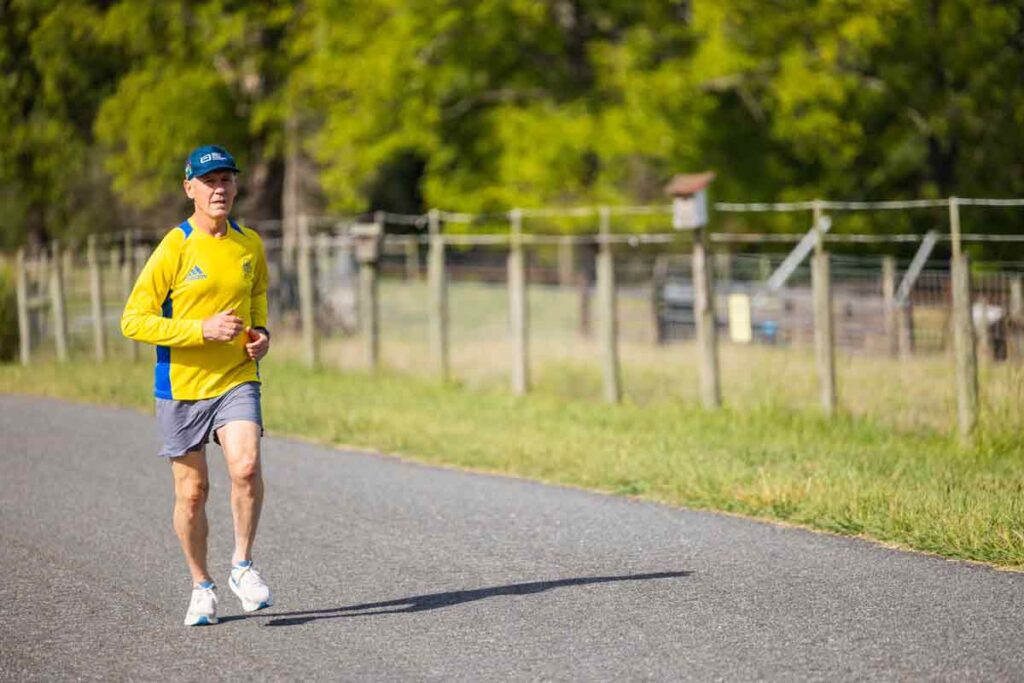When Harry Landers found himself in the ICU following an open heart bypass surgery, he spotted a whiteboard in the hall. Harry’s left main coronary artery had been blocked, which led to testing and surgery at UVA Health.
On that whiteboard was the word “Goals.” He asked his wife, Janis Jaquith, to pick up a marker and write his goal on the board: to run the 2024 Tokyo Marathon.
“He makes me laugh every day. Every day,” says Janis, chuckling about Harry’s ambitious goal. It was a big contrast to Harry lying in bed, recovering from surgery.
But about 6 months later, the UVA Health heart team that performed Harry’s heart bypass got a picture in the mail. It was Harry, in Tokyo, at the 2024 marathon.
Racing Against the Odds
There’s a history of heart disease in Harry’s family. But he thought he had it beat – he exercises often. He loves running and trains for marathons. But Harry wasn’t outrunning his creeping coronary artery disease.
“I love training,“ says Harry. “I love running with my friends who are training for marathons with me.” With all of his exercising, he didn’t believe he could have the same heart issues he’d seen in his family. “Because I was fit, I assumed that meant that I was healthy. But what’s going on inside doesn’t necessarily bear any relationship to that.”
Harry had developed atherosclerosis in his left main coronary artery. Atherosclerosis is a buildup of plaque that causes a blockage in the artery and prevents blood from flowing properly.
Wondering about your heart health?
Our heart disease experts can answer your questions about your heart.
One night, Harry’s blocked artery began causing a serious problem. “I could hear him kind of gasping with these odd sounds, and he was absolutely rigid,” recalls Janis. Harry quickly recovered from that episode, but it happened again the next night. “Exactly the same time, 4:00 in the morning. The rigidity and the gasping, gasping. And then he stopped.” Janis checked Harry’s chest and couldn’t hear his heart. But then Harry recovered again. “That took a much longer time.”
That’s when Harry and Janis decided to see a doctor right away.
Turning Setbacks into Strides
It took some digging, but Harry’s heart doctors finally found the source of his episode. At first, they checked Harry’s brain, but that wasn’t where his health issues were coming from. They then decided to check Harry’s heart using a stress test.
They found the blockage in his left coronary artery. He needed surgery to restore good blood flow to his heart. For Harry’s case, bypass surgery is the gold standard.
About half of Americans between 45-84 have atherosclerosis, but they don’t know it. It can cause symptoms like chest pain or pressure, sudden weakness, vision or speech problems, and other issues.
Don’t ignore these symptoms. They can lead to a heart attack, stroke, or other emergency.
Determination, Healing, and 26.2 Miles
Harry’s surgery was a success, and he found himself on the road to recovery. He worked closely with his care team on what his recovery would look like.
“There was a very clear script that I would meet with certain people,” notes Harry. “They would tell me what was going to happen. I got set up with somebody who was kind of a resource all the way through. I felt like I was in good hands,” he says. “Once I got home, I had a regimen right from the beginning.”
Treat Your CAD, Prevent a Heart Attack
CAD progresses slowly and can surprise you. You might not have any symptoms until it becomes serious. Having the right diagnosis and treatment plan is essential to prevent an emergency. Discover how we can help you in managing your heart health journey.
When Heart and Willpower Combine
Harry credits his providers with helping him reach his big goal following heart bypass surgery. “It felt like the Rolls Royce of hospitals,” he says about his time at UVA Health. “Just the quality of the nursing care, the attentiveness. Yeah, it was really a difficult experience, but it was the best way to experience what I had to.”
Not only did Harry run the 2024 Tokyo Marathon, but a month after that, he ran the Boston Marathon. “I have this streak of running the Boston Marathon. I’ve done it 16 times,” smiles Harry.
Harry’s Journey in His Own Words
See Harry discuss his heart blockage and bypass surgery.
What gives me much of the pleasure of, of my life is is running, and training for and running marathons.
I was starting at base zero. I had no fitness whatsoever, but I also had this sense of this is a base that I can build from.
Deanna McIntire: We don’t have patients that run hours and hours and hours several months after this surgery. So, it was a a bit of an unknown, but also a way to learn.
Harry: After the 30-day checkup, I started a cardiac rehab program. I kind of implemented my own training program.
Once I finished cardiac rehab and I looked at the calendar for the Tokyo Marathon, I realized I had about 8 to 10 weeks to get ready for that marathon. So, it was a highly concentrated training period. I loved the process of getting fitter every day.
Just because you’re starting at a low base doesn’t mean you’re not going to climb that hill very gradually over a period of time. It’ll get better.
